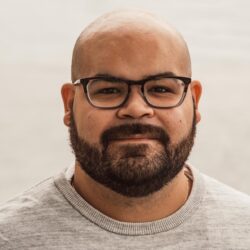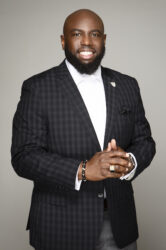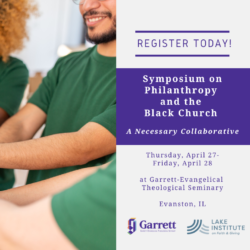Fundraising or Liberation?
Fundraising or Liberation?
Our guest writer, Dr. Jorge Juan Rodriguez V serves full-time as the Associate Director for Strategic Programming at the Hispanic Summer Program (HSP)—a nonprofit that creates year-round educational spaces for Latinx graduate students of theology and religion. Lake Institute partners with HSP to offer El Semillero, a training on fundraising for Latinx practitioners. We asked Dr. Rodriguez to share insights from that training here.
 by Jorge Juan Rodríguez V, Ph.D.
by Jorge Juan Rodríguez V, Ph.D.
A prominent theology of money stemming from the Latinx community is a Theology of Liberation that, given Latin America’s history of extraction, questions how money operates and how capitalism as a system for organizing money continues to promote current economic inequalities. This leads many Latinx fundraisers to ask: how can we fundraise within a system that has historically extracted wealth from our countries of origin and communities of concern?
Responding to the ways global capitalism and U.S. interventionism created abject poverty across Latin America in the mid-20th century, Liberation Theology argued that God was on the side of the oppressed. From this theological claim, Latin American Liberation Theologians developed a systemic analysis that soberly examined how capitalism as a system necessitates social inequality for profit margins to emerge. Such a critique was grounded in a historical analysis of multinational corporations extracting wealth from Latin America and bringing it to the United States.
Historical Patterns of Economic Extraction
While colonialism in the Americas extends as far back as the 1400s, by the 20th-century globalization brought a new flavor to colonial extraction. After the U.S. re-colonized Puerto Rico in 1898, for example, U.S.-based sugar companies swiftly established businesses throughout the island. Aided by White Protestant missionaries, by the 1920s well over 40% of Puerto Rico’s sugar production was controlled by three corporations—among them what is known today as “Domino Sugar”—and sugar accounted for 60% of the island’s exports. This pattern extended throughout the 1900s as U.S. corporations monopolized entire sections of Latin America to bring resources and profits back to the United States. In places like Honduras, multi-national fruit companies like what is now known as “Chiquita” established “banana republics.” These companies often depended on local authoritarian rule to quell labor uprisings and protect their profits, laying the foundation for the U.S. government to encourage coups and establish puppet governments throughout Latin America by the mid-20th century leading to civil wars, deaths, and disappearances.
Not surprisingly, this same inequality found in Latin America was mirrored in both rural and urban contexts on “this side of the border.” In the 1960s and 1970s groups like the United Farm Workers, PADRES, Las Hermanas, and the Young Lords emerged as Latinx activists who found resonance with the liberationist challenge to both economic inequality and capitalism. Their activism provided a critical examination of the experiences of Latinxs in the U.S.
In 2023 many continue to find resonance with these liberationist/activist frameworks. According to the JAMA Network, since the beginning of the COVID-19 pandemic, Black/Latinx people have been more likely to die or lose a caretaker due to COVID-19, in part because these same populations are more likely to live in poverty and work “essential” jobs that often lack necessary protections. Through a liberationist lens we can see that such disparities are merely a continuation of a system that has—for centuries—functioned through extraction.
For those of us who work with Latinx communities around the intersections of faith, fundraising, and philanthropy, a clear tension arises from this history. On the one hand, economic inequality requires immediate and long-term financial growth and within our current system, fundraising and philanthropy provide a clear way forward. On the other hand, inequality exists because of how our current system has developed through historical patterns of economic extraction that have disproportionately targeted the Latinx community.
Latinx Philanthropic Tensions
This tension was made evident when the Hispanic Summer Program and Lake Institute worked together in 2022 to facilitate a training on fundraising for Latinx practitioners called El Semillero. For some in the room, a central concern was how we could even talk about raising money when the very reason inequality exists is due to the extraction of resources from our very own communities and countries of origin. And while this tension was not resolved in our conversations it did make plain a central lesson that all of us in fundraising roles should reflect on: namely that all theologies of money are birthed from history, shaped by power, and experienced in different ways by different communities.
Even as individuals at El Semillero had distinct upbringings with money and differing relationships to Liberation Theology, there was no denying the liberationist theology of money had resonance in the group precisely because as Latinxs we understood the individual, familial, communal, and multi-generational effects of extraction.
We understood the ways the border crossed some of us, while others were forced to migrate, all losing our homes in the process. We understood the stories of some of our elders who spoke of toiling in the grueling sun as pesticides dropped on their heads from above and landowners scheduled ICE raids instead of paying them their wages. We understood how the social mobility promised “within the system” didn’t save us from experience after experience where we were assumed to be “deficient” due to the ways we are racialized and presumed “foreign” irrespective of our country of birth. We understood the ways our Black and Brown organizations have had to work twice as hard to be half as profitable.
So while the tension, for many, emerged from a distinct theological framework that was liberationist in nature, it resonated with all because of how it spoke to the collective experience of a people who have had to resist from the underside of power.
Beyond Individualism
For this reason, we can’t discuss “theologies of money” as simply emerging from the experiences of individuals. In Tema Okun’s “Tenets of White Supremacy” framework, a central function of whiteness is to privilege individualistic ways of thinking. In the context of fundraising, then, we need to critically interrogate the ways we are asked to talk about theologies of money as simply emerging from our individual experiences with wealth: whether we as individuals grew up rich or poor, whether we as individuals moved up the class ladder, and how this affects our individual perspectives on fundraising.
To discuss theologies of money solely from the perspective of “individual religious fundraisers” ignores a history of extraction that Latinxs know too well, all while obfuscating the ways that every aspect of philanthropy is tied to a history shaped by white power and white privilege. Edgar Villanueva argues that we see this structurally as “90 percent of foundation CEOs are white, 85 percent of foundation boards are white, while no more than 10 percent of foundation funding goes specifically to people of color.” Clearly, this structural reality mirrors an epistemological one: a white-dominant world has socialized us to think about and frame conversations about money around individual experiences with wealth as if these experiences exist independent of extractive histories that have created systems of inequality.
One way to push against this individualist impulse is to begin fundraising conversations, as we did at El Semillero, by examining critical histories of money written by authors like James Hudnut-Beumler, Edgar Villanueva, Kathryn Tanner, Filipe Maia, and Lucia Hulsether who make plain that our current approaches to money—and thus to fundraising—did not emerge ex nihilo but were created over time by systems that reflected particular values, ideals, racializations, and manifestations of power. Only when we begin from this place of critical analysis can we move towards more honest conversations about fundraising that may yield innovative approaches that don’t reproduce extraction but rather invite justice and sustainability. Failing to do so ignores the “elephant in the room”: that all theologies of money are historically shaped by realities of race and power.
 Dr. Jorge Juan Rodríguez V is a scholar, educator, and administrator. In addition to his role as Visiting Assistant Professor of Historical Studies at Union Theological Seminary, Dr. Rodriguez serves full-time as the Associate Director for Strategic Programming at the Hispanic Summer Program—a nonprofit that creates year-round educational spaces for Latinx graduate students of religion.
Dr. Jorge Juan Rodríguez V is a scholar, educator, and administrator. In addition to his role as Visiting Assistant Professor of Historical Studies at Union Theological Seminary, Dr. Rodriguez serves full-time as the Associate Director for Strategic Programming at the Hispanic Summer Program—a nonprofit that creates year-round educational spaces for Latinx graduate students of religion.
Questions for Reflection
-
- How does reflecting on the history of money impact your relationship to it in your context?
- If you haven’t considered the history of money, what’s one thing you can do to start thinking about it more deeply?
Expanded Perspective
As senior pastor, I ground my biblical stewardship and generosity in Matthew 2:21, “For where your treasure is, there your heart will be also.” Henri Nouwen suggests that “Fundraising is proclaiming what we believe in such a way that we offer other people an opportunity to participate with us in our vision and mission.”
Based on Nouwen’s premise, our theology of money, fundraising, and capitalism can be understood and interpreted through the lens of historically marginalized groups. Recognizing the global shift towards capitalism, as an economic and political system that has enormously impacted economic inequalities around the globe especially in communities of color, has generated more inequalities. It is our hope at Lake Institute that faith communities ground their understanding of stewardship and fundraising as Nouwen has suggested: an “opportunity to announce a vision and invite other people into the mission of your organization.”
While we understand that fundraising is not a response to a crisis, we acknowledge that the socio-political and economic realities created through historical oppression of marginalized groups greatly impact how fundraising is taught within faith communities. Furthermore, the historical emphasis on individualism is counterintuitive to the communal fabric of most marginalized communities. Consequently, how we teach and understand generosity should not be apart and separate from our theology of community.
The philanthropic world stands to gain much from revisiting its historical lens on how generosity is defined, studied, and taught. Further, marginalized communities are challenged to think about how we engage our understanding of generosity given historical inequalities and oppression. Our understanding of the biblical definition of stewardship leads us to reflect the image of God over the care, maintenance, and protection of all creation. The question still lingers: is there a link between our understanding of stewardship and the marginalization of our communities?
Symposium on Philanthropy and the Black Church
A Necessary Collaborative
April 27-28, 2023 | In-person at Garrett-Evangelical Theological Seminary | Evanston, IL
Join us for this special two-day event that will bring together scholars and practitioners from philanthropy and the Black church. This conversation will allow us to learn from past chapters of engagement across the faith-philanthropy divide and to dig into the challenges and opportunities for our own time.
Speakers include Dr. Robert Franklin of Emory University, Rev. Debra Haggins of Hampton Ministers Conference, author and philanthropic leader Valaida Fullwood, Jeanné Lewis of Faith in Public Life, Devin Murphy of Bridgespan Group, and others.
Event sponsored by Lake Institute on Faith & Giving and Garrett-Evangelical Theological Seminary Center for the Church and the Black Experience.
In-Person ECRF in Greenville, SC
Presbyterian College is partnering with Indiana University Lilly Family School of Philanthropy’s Lake Institute on Faith and Giving to offer, for the first time in the southeast region, the Executive Certificate in Religious Fundraising (ECRF).
This hybrid, in-person and online, program allows students the opportunity to earn a certificate in fundraising as they explore motivations for giving in the nonprofit sector. The class begins with a required two and half days in-person (May 22-24) teaching sessions in Greenville, South Carolina, hosted by Presbyterian College, three additional online teaching hours, and ends with a practical application project.
learn more and register
Subscribe
Insights, a bi-weekly e-newsletter, is a resource for the religious community and fundraisers of faith-based organizations that provides:
- Reflections on important developments in the field of faith and giving
- Recommended books, studies and articles
- Upcoming Lake Institute events



